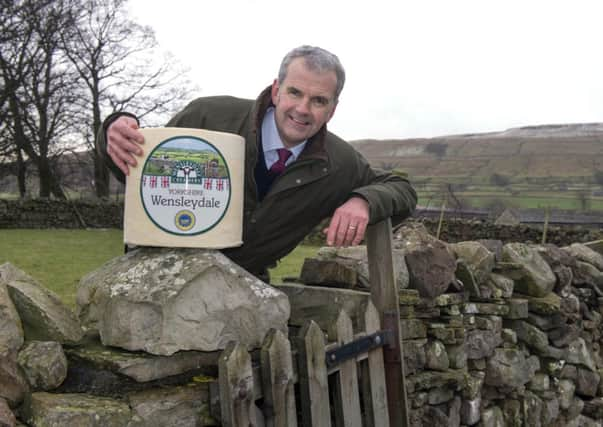Boost for local economy set to follow European cheese ruling


Wensleydale cheese has been afforded the same hallowed status as Parma Ham and Champagne following a ruling by the European Union.
The newly conferred status means no other cheese-maker outside the designated area can produce a cheese and call it Yorkshire Wensleydale.
Advertisement
Hide AdAdvertisement
Hide AdThe maker of the crumbly delicacy, the Yorkshire Dales-based Wensleydale Creamery, has finally won its long campaign for Protected Geographical Indication (PGI) status for its product.
The award, announced this week, marks victory for the Yorkshire Post’s Uniquely Yorkshire campaign, which has been running for several years to give the cheese PGI status.
Farming Minister, George Eustice said: “It’s great to see Yorkshire Wensleydale join the growing number of British products registered under the protected food names scheme, especially at this time of year when the delicious cheese will be an essential item for the festive family cheeseboard.
“PGIs help to keep traditional recipes alive and make a valuable contribution to the local and national economy,” Mr Eustice added.
Advertisement
Hide AdAdvertisement
Hide AdDavid Hartley, managing director of The Wensleydale Creamery, said: “All of the team at The Wensleydale Creamery are thrilled that our cheese has now been recognised by the European Commission.
“There could be no better early Christmas present for the whole team here and it is a great platform to propel us into 2014.”
Foreign Secretary William Hague, whose Richmond constituency includes Hawes, where the creamery is based, said: “Achieving PGI status means many things for Yorkshire Wensleydale cheese; it means more international recognition and more awareness of The Wensleydale Creamery.
“It has been great to see the business succeed and grow, especially over the last twenty years.
Advertisement
Hide AdAdvertisement
Hide AdThe Wensleydale Creamery has become a great place for visitors to Wensleydale, as a tourist attraction, as well as producing this great range of remarkable cheeses,” he added.
The Wensleydale Creamery also sources milk from local family farms, to help ensure the quality and authenticity of its Yorkshire Wensleydale cheese, which also helps to contribute more than £10m to the local Dales economy.
This early Christmas present for the much-loved Yorkshire brand ensures no other cheese-maker outside the Wensleydale area can produce a cheese and call it Yorkshire Wensleydale.
The Wensleydale Creamery will add the PGI symbol to its packaging, reaffirming its true Yorkshire Wensleydale credentials and helping shoppers differentiate it over other Wensleydale cheese, which are made in other counties.
Advertisement
Hide AdAdvertisement
Hide AdThe creamery uses traditional methods to handcraft cheese to time-honoured recipes, using milk from local farms as well as being innovative with the development of new recipes.
The business, owned by Wensleydale Dairy Products Ltd, now employs over 200 across two manufacturing sites and supplies a broad range of customers including major multiple retailers, exporters and wholesalers.
Wensleydale Cheese has a historic pedigree and was first made in the Dale in 1150 by Cistercian monks. These days the Yorkshire institution is beloved by Wallace and Gromit and famous the world over.
Mr Hartley said prior to application being successful that gaining the status would “protect the integrity and provenance of our cheese” and differentiate it from manufacturers outside the region.
Advertisement
Hide AdAdvertisement
Hide Ad“We strongly believe that it is important to use EU protection to safeguard the only Wensleydale cheese actually made in Wensleydale,” Mr Hartley said earlier.
“Real Yorkshire Wensleydale Cheese is a community-based product, built on centuries of tradition and it is made in Wensleydale by local skilled people, using locally produced milk from family farms.”